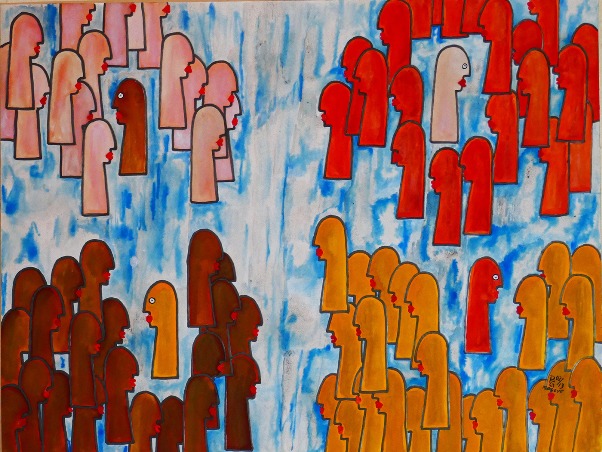Art Salon "Berlin - Magoye - Berlin" Exhibition Migration

MIGRATION
Peter Gustavus
exhibition
11.01. - 05.03.2019
Mon to Fri 9-17 clock
Robert Koch-Institute
Nordufer 20, 13353 Berlin
Underground station Westhafen or Amrumer Straße
S-Bahnhof Westhafen
Organization: Eva Fisher (This email address is being protected from spambots. You need JavaScript enabled to view it.)
Artist contact: This email address is being protected from spambots. You need JavaScript enabled to view it.

opening day
Friday 11th January 2019, 7pm
Gallery in the transition and foyer
Introduction Tirhas Tesfei
About this exhibition:
General remarks:
Migration comes from the Latin word "migratio", which means migration.
It is the kind of place change in which individual individuals or groups of individuals leave or change their settlement area. One differentiates:
- Emigration as permanent removal (emigration)
- immigration as immigration or immigration and
- Permigration as a passage or migration.
It is a phenomenon in animals and humans, a kind of life or survival strategy. Your walk increases your chance for life or an improvement of the same. Just think of monarch butterflies from north to south in America, the migration of wildebeests in the African savannah, the migration of birds from Europe to Africa, or fish from the sea into the rivers.
We, too, have been walking since the beginning of our existence, otherwise Homo sapiens would step on each other's feet in East Africa. The reasons for migration are complex as the species that practice them. Migration is an effect of the survival instinct. If we look at human migrations, we realize that there have been and always will be migratory movements in all times and in many places on earth. Here are just a few of the larger migratory movements mentioned:
- The spread of primitive man from Africa to the other continents
- The westward movement of Indo-European peoples from India to Europe
- The movement of the Mongol peoples eastwards towards China - it should be remembered that even the largest structure on earth, the Great Wall of China, could not stop migration - but also westward towards Europe (Hunfeld campaigns)
- The European Migration, v.a. the Germanic peoples to the west and south to North Africa (Kingdom of the Vandals in the Maghreb)
- The southward movement of the Bantu peoples from the Guinea bow over the area of central and southern Africa and the colonization of the European settlers who invaded, eradicated, or at least subjugated the populations found there on all non-European continents.
The ways of migration were very different, some were relatively peaceful, some were warlike. Just as different were the results of these actions. In some cases, the newcomers conquered the land of the hitherto resident population, in other cases assimilated in found structures. However, the situation is judged from a variety of perspectives - the majority sees it differently than the minority, the winners and losers rate it differently, and the people who benefit from it and those who experience a disadvantage consider it equally differentiated.
In today's global world, where the interdependencies of states and societies are growing, in which information circles the earth in the present time, people are better able to figure out why one is going bad and where one is likely to get better. Who knows this and weighs the risks for himself, will therefore make the decision for himself, whether he stays or goes. The worse the conditions at the current location and the lower the migration risk, the more willing you are to emigrate.
If we have the opportunity today to control migration and, for example, reduce flight grounds, organize migration so as to create a win-win situation for the societies concerned, that is definitely much better than a tough confrontation between those affected. In that sense, a migration pact such as the United Nations has created is a step in the right direction. But it is certainly not a self - perpetuity, but requires all those involved to work hard, a high degree of good will and tolerance, which is often confused with indifference and not seen as tolerating or enduring what it actually means (tolerance comes from lat.> tolerate, endure <) and discuss the topic fairly and along facts and not on the basis of fake news and populist Stammtisch slogans. Also this exhibition should be a small contribution of this social discussion.



